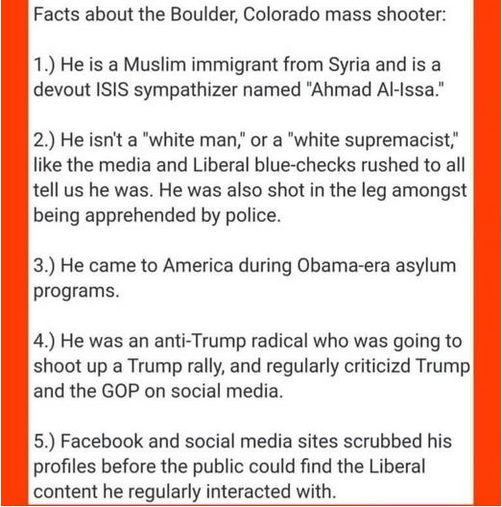Search the Community
Showing results for 'colorado'.
Found 692 results
-
Dems in Colorado pushing new gun law.
All semi automatic guns with detachable magazines are proposed to be banned. After spending part of last summer in Colorado, shouldn’t they be more interested in fixing the moon craters on the roads around Denver and the crazy homelessness situation? This is another race to the bottom.
-
Former Colorado clerk Tina Peters, one-time hero to election deniers, convicted in computer breach
Another one bites the dust. https://apnews.com/article/tina-peters-election-computer-breach-8a171657321dd595dfd2dd81e0a0a848
-
81 Million My Ass
Meanwhile, in the real world. AP NewsJury finds MyPillow founder defamed former employee for a...A federal jury in Colorado has found MyPillow founder Mike Lindell defamed a former employee for a leading voting equipment company.
-
Colorado Gets It Right…
- 90 deals in 90 days FAIL
'Furious' Democratic senator unleashes on his own party for its failures Sun, May 25, 2025 at 10:00 PM UTC Sen. Michael Bennet, D-Colo., revealed on Sunday he is "furious" at the Democratic Party for losing to President Donald Trump twice and believes his party's brand is tarnished nationally. "I don’t think nationally, the Democratic brand helps very much anywhere. If it did, we wouldn‘t have lost to Donald Trump twice. I know a lot of supporters of mine and friends of mine are furious at Donald Trump. I am… Furious at people they think aren‘t standing up enough to Donald Trump. I am. But I’m also furious that the Democratic Party that has lost twice to Trump," Bennet told CNN host Jake Tapper. Tapper asked Bennet if the Democratic Party’s "record low popularity" would hurt his aspirations to become governor of Colorado. An April Fox News poll showed that the Democratic Party is underwater with voters, with a net negative 10% favorability rating. A Pew Research poll found that 60% of respondents had an unfavorable view of the Democrats, and a Wall Street Journal poll had the same result. Sen. Michael Bennet said he's furious at the Democratic Party Bennet claimed Trump was sent to D.C. by voters twice to "blow the place up," because they are sick of the "self-interested" partisanship in Congress. The Colorado senator went on to blast his party for failing to provide Americans with real solutions for the economy, and declining student outcomes in education. "I think they’re sick of a Democratic Party who hasn‘t been able to show how we’re going to address an economy where the middle class continues to shrink and where, over the last 20 years, we’ve actually lost ground in terms of, you know, the achievement of our kids in school. We need to address those things," he said.- 54% of Americans Approve of Colorado Kicking Trump Off Ballot -- Including a Quarter of Republicans
54% of Americans Approve of Colorado Kicking Trump Off Ballot -- Including a Quarter of Republicans A new poll conducted by YouGov America found that 54% of Americans — and even 24% of Republicans — approved of the Colorado Supreme Court’s decision to kick former President Donald Trump off of its 2024 presidential primary ballot. The court released its opinion holding that Trump was ineligible to reprise his role as president because of the 14th Amendment’s clause barring insurrectionists from holding office on Tuesday evening, concluding that the evidence brought to it “established that President Trump engaged in insurrection” by attempting to overturn the results of the 2020 presidential election. While some anti-Trump stalwarts have praised the decision, many have criticized it as an attack on democracy and act of political gamesmanship. But early polling shows that a majority of Americans support the opinion. According to the YouGov survey of 3,492 respondents, 54% of the country approve of the Court’s conclusion and 38% strongly approve of it. A combined 35%, meanwhile, either strongly or somewhat disapprove of it. Predictably, the vast majority of Democrats (84%) support Trump’s removal from the ballot. But so does a plurality of independents (48%), and even a decent proportion of Republicans (24%). https://www.mediaite.com/news/new-poll-54-of-americans-approve-of-colorado-kicking-trump-off-ballot-including-a-quarter-of-republicans/- Voting in Colorado
https://www.instagram.com/reel/C1GifQxudoX/?igsh=MWg5OXM1enFjYm13NQ==- Colorado hiker missing for months found dead, his dog still alive by his side
Wow...man's best friend. https://www.foxnews.com/us/colorado-hiker-missing-for-months-found-dead-his-dog-still-alive-by-his-side- Joe Biden and the left fucked this country 6 ways to Sunday
Yup all under Biden and his party.. The damage they did may be unrepairable.https://www.reuters.com/world/us/fbi-investigating-targeted-terror-attack-boulder-colorado-director-says-2025-06-01/- Colorado Ped Patrol
- Six accused of forging names of dead people so Colorado candidate could make primary ballot
Six accused of forging names of dead people so Colorado candidate could make primary ballot Colorado Attorney General Phil Weiser on Tuesday announced his office has charged six people for allegedly submitting petitions with forged signatures in an attempt to get a 2022 Republican Congressional candidate on the ballot. The six individuals — Alex Joseph, Terris Kintchen, Patrick Rimpel, Jordahni Rimpel, Aliyah Moss and Diana Watt — were paid circulators for Grassfire, LLC, an Oregon-based professional petitioning firm, the attorney general’s office said in a news release. The firm was hired by the Carl Andersen campaign, a Republican candidate running for Colorado’s 7th Congressional District, an area anchored by Jefferson County. Brittany Pettersen, a Democrat, handily won the seat in November’s election. Prosecutors say Andersen’s campaign hired Grassfire to collect the necessary 1,500 valid signatures to get on the Republican primary ballot. The Secretary of State’s Office rejected the petition, however, due to an insufficient number of valid voter signatures on the petition. https://www.msn.com/en-us/news/politics/six-accused-of-forging-names-of-dead-people-so-colorado-candidate-could-make-primary-ballot/ar-AA1cO46s?ocid=msedgntp&cvid=39cbc4ec53774f6aaf3bc0ec1b56d889&ei=78- Colorado new EV tax credit
Dang that makes some Tesla’s pretty cheap. Under 38k for a model Y long range. You get $12500 off from MSRP. Pretty good deal for Colorado residents https://electrek.co/2023/05/29/colorado-ev-state-tax-credits/ Let’s say you want to buy a new Tesla Model Y Long Range with Dual Motor All-Wheel Drive. I’ve not added any extras when choosing the model, so the cost is $50,490 before state sales tax. This model already qualifies for the federal tax credit of $7,500, and from July 1, it also qualifies for Colorado’s state tax credit of $5,000. That drops the price down to $37,990, and some folks in Colorado may qualify for rebates from their utilities as well.- Colorado banning gas powered lawn equipment….
https://electrek.co/2023/04/27/colorado-may-follow-ca-in-banning-gas-lawn-equipment-in-2025/- "A drag dancer stomped on the gunman with her high heels." Hate crime charges filed in Colorado
"A drag dancer stomped on the gunman with her high heels." Hate crime charges filed in Colorado Source-https://www.nytimes.com/live/2022/11/21/us/colorado-springs-shooting-news Title-An Army veteran says he went into ‘combat mode’ to disarm the gunman COLORADO SPRINGS — Richard M. Fierro said he was at a table in Club Q with his wife, daughter and friends on Saturday, watching a drag show, when the sudden flash of gunfire ripped across the nightclub. His instincts from four combat deployments as an Army officer in Iraq and Afghanistan instantly kicked in. Fight back, he told himself. snip-"...tackling the gunman and beating him bloody with the gunman’s own gun.." snip-" Mr. Fierro, who served in the Army for 15 years, said he raced across the room, grabbed the gunman by a handle on the back of his body armor, pulled him to the floor and jumped on top of him." snip-" As the fight continued, he said, he yelled for other club patrons to help him. A man grabbed the rifle and moved it away to safety. A drag dancer stomped on the gunman with her high heels. The whole time, Mr. Fierro said, he kept pummeling the shooter’s head while the two men screamed obscenities at each other."- Colorado Senate Race
He just can’t help himself…😂😂- Giant ice burg melting and falling apart in Colorado. Dang
https://www.climbing.com/news/rockslide-destroys-classic-boulders-rocky-mountain-national-park/- Colorado Invites Disney to Move Amid 'Socialist' Attacks From Ron DeSantis
https://www.newsweek.com/colorado-invites-disney-move-amid-desantis-attacks-1699450- Colorado is seeing a COVID-19 surge right now. Hospitals
https://www.deseret.com/coronavirus/2021/11/3/22761167/colorado-new-covid-19-cases-hospitals- Colorado Shooter is a Muslim who hates trump
- Colorado Shooter information
- do you have more than $43,600 in the bank?
Can you pass a seven-question quiz on financial literacy? Most Americans could not. Many American consumers fail to grasp the basic math of inflation, according to a large-scale study of financial literacy. Here are the states with the strongest, weakest financial literacy The FINRA foundation reached enough respondents to rank all 50 states and the District of Columbia on financial literacy. Here are the states where the most quiz-takers got at least five of seven questions correct: Minnesota (34.8% of respondents got 5 or more questions correct) Wisconsin (34.5%) District of Columbia (34.4%) Colorado (33.9%) Wyoming (33.9%) And here are the states with the weakest financial literacy: Louisiana (18.1% of respondents got 5 or more questions correct) Mississippi (19.2%) Alabama (20.2%) West Virginia (21.4%) New Mexico (23.2%) https://www.usatoday.com/story/money/2025/04/19/american-consumers-inflation-financial-literacy-quiz-education/83145630007/ ironic timing, and the low scoring states align nicely with the amount of savings in the original post.- Massive 14-hour line forms as Colorado gets first In-N-Out Burger jointsRe
Really? Are these people this dumb? For a fuckin hamburger? https://www.foxnews.com/food-drink/massive-line-colorado-in-n-out-burger-joints- anyone here a Medicaid expert?
Medicaid represents nearly $1 out of every $5 spent on health care in the U.S. and is the major source of financing for states to provide health coverage and long-term care for low-income residents. Medicaid financing is shared by states and the federal government with a guarantee to states for federal matching payments with no pre-set limit. The percentage of costs paid by the federal government (known as the federal medical assistance percentage or “FMAP”) varies across states, for specific services and types of enrollees, and depending on whether the costs are for medical care or program administration. The match rate has also been temporarily adjusted during economic downturns and most recently during the COVID-19 pandemic. The FMAP for services used by people eligible through traditional Medicaid, which includes individuals who are eligible as children, low-income parents, because of disability, or because of age (65+), is determined by a formula set in statute. The formula is designed so that the federal government provides a match rate of at least 50% and provides a higher match rate for states with lower average per capita income. The resulting FMAP varies by state and ranged from 50% (the FMAP “floor”) in ten states (California, Colorado, Connecticut, Maryland, Massachusetts, New Hampshire, New Jersey, New York, Washington, and Wyoming) to 77% in Mississippi for federal fiscal year (FFY) 2026 (Figure 1). States With Lower Per Capita Incomes Have a Higher Federal Matching Rate for Medicaid Federal Medicaid Assistance Percentages (FMAPs) for Traditional Medicaid Spending Effective for FFY 2026 To participate in Medicaid and receive federal matching dollars, states must meet core federal requirements. States must provide certain mandatory benefits (e.g., hospital, physician, and nursing home services) to core populations (e.g., low-income pregnant women, children, people with disabilities, and people ages 65 and older) without waiting lists or enrollment caps. States may also receive federal matching funds to cover “optional” services (e.g., adult dental care and home care, also known as home and community based services) or “optional” groups (e.g. people with income above the limits established for core populations). States also have discretion to determine how to purchase covered services (e.g., through fee-for-service or capitated managed care arrangements) and to establish provider payment methods and rates. Medicaid also provides “disproportionate share hospital” (DSH) payments to hospitals that serve a large number of Medicaid and low-income uninsured patients to offset uncompensated care costs. DSH payments totaled over $17 billion in FFY 2023. Federal DSH spending is capped for each state and facility but within those limits, states have considerable discretion in determining the amount of DSH payments to each DSH hospital. The Affordable Care Act (ACA) called for a reduction in federal DSH allotments starting in FFY 2014 based on the assumption of reduced rates of uninsurance, but the cuts have been delayed several times (most recently delayed until April 1, 2025). DSH is one type of a broader set of “supplemental” payments that states make to supplement Medicaid “base” payment rates that often do not fully cover provider costs; unlike other supplemental payments, DSH payments can also be used to pay for unpaid costs of care for the uninsured. There are special match rates for the ACA expansion group, administration, and other services. While the traditional FMAP applies to the vast majority of Medicaid spending, there are a few exceptions that provide higher match rates for specific services or populations, such as family planning and most notably people covered under the ACA Medicaid expansion. States that have implemented the expansion currently receive a 90% FMAP for adults covered through the ACA Medicaid expansion. States that had not adopted the expansion as of 2021 when the American Rescue Plan Act was enacted are eligible for a 5% increase in the state’s traditional FMAP for two years if they implement the expansion. Administrative costs incurred by states are usually matched by the federal government at a 50% rate, but some functions such as eligibility and enrollment systems receive higher match rates. Medicaid administrative costs are less than 4% of total Medicaid spending. Unlike in the 50 states and D.C., annual federal funding for Medicaid in the U.S. territories is subject to a statutory cap and fixed matching rate. Once a territory exhausts its capped federal funds, it no longer receives federal financial support for its Medicaid program during that fiscal year. Over time, Congress has provided increases in federal funds for the territories broadly and in response to specific emergency events. Various pieces of legislation during the pandemic significantly increased the allotments for each of the territories and also raised the FMAP rates from the statutory level of 55% to 76% for Puerto Rico and 83% for the other territories. The 2023 Consolidated Appropriations Act extended the 76% FMAP for Puerto Rico through FFY 2027 and made the 83% match rate for other territories permanent. Both the federal government and states are responsible for promoting program integrity. Program integrity broadly refers to the proper management and function of the Medicaid program to ensure it is providing quality and efficient care while using funds–taxpayer dollars–appropriately, with minimal waste. Improper payment reports in recent years have highlighted program integrity issues, and both the previous Trump Administration and the Biden Administration worked to advance program integrity, though through different means. Improper payments, which are often cited when discussing program integrity, are payments that do not meet Centers for Medicare and Medicaid Services (CMS) program requirements (they can be overpayments, underpayments, or payments with insufficient information to determine whether the payment was proper). Improper payments are not the same as criminal activities like fraud and abuse, which may be a subset of improper payments. CMS estimated the overall Medicaid improper payment rate was about 5% in 2024, the lowest rate since the COVID-19 pandemic began due, in part, to flexibilities granted during that time. Most improper payments (79%) were due to insufficient information (or missing administrative steps), not necessarily due to payments for ineligible enrollees, providers, or services (i.e., since they may have been payable if the missing information had been on the claim and/or the state had complied with requirements). The improper payment estimation process is not designed to detect or measure fraud. Program integrity efforts focused on areas identified as major contributors of improper payments, such as monitoring provider screening and enrollment for noncompliance, likely yield greater returns than focusing on reducing errors in eligibility determinations that could make it more difficult for eligible people to obtain and maintain coverage. and a lot more info... KFFMedicaid Financing: The Basics | KFFMedicaid represents $1 out of every $5 spent on health care in the U.S. and is the major source of financing for states to provide health coverage and long-term services and supports for low-income... 74M Americans to the tune of $871.6 Billion- Trump threatens new 50% tariffs on China
Michigan Democratic Gov. Whitmer partly backs tariffs before again meeting with Trump JOEY CAPPELLETTI Updated Wed, April 9, 2025 at 4:04 PM CDT 1.7k Democrats WhitmerMichigan Gov. Gretchen Whitmer speaks with former television journalist Gretchen Carlson, not shown, at an event on Wednesday, April 9, 2025, in Washington. (AP Photo/Mark Schiefelbein) ASSOCIATED PRESS More LANSING, Mich. (AP) — Michigan Gov. Gretchen Whitmer delivered a speech emphasizing points of agreement with President Donald Trump on economic policy, just hours before their scheduled meeting — a reflection of the high-profile Democrat’s more diplomatic approach toward the president as her party ramps up its attacks on him. Framed by Whitmer as a “blueprint for success,” her lengthy “Build, America, Build” address called for bipartisan cooperation to boost American manufacturing. While she offered soft criticism of the president, she also underscored shared priorities. “I understand the motivation behind the tariffs, and I can tell you, here’s where President Trump and I do agree. We do need to make more stuff in America,” said Whitmer, before adding, “I’m not against tariffs outright, but it is a blunt tool. You can’t just pull out the tariff hammer to swing at every problem without a clear defined end-goal.” The address, rescheduled from last week due to severe ice storms in northern Michigan, came ahead of her second one-on-one meeting with Trump in less than a month, in addition to a dinner at the White House where she sat next to him. Trump praised Whitmer as a “very good person” who has done an “excellent job” Wednesday afternoon, as the high-profile Democrat stood in the Oval Office while he signed executive orders and took aim at political opponents. Trump added that “we'll come home with a winner for Michigan.” Wednesday’s meeting follows Trump’s announcement of new tariffs expected to disproportionately affect Michigan, whose economy is closely tied to an auto industry reliant on trade with Canada, Mexico and other countries. She added that she would also be meeting with members of Trump's Cabinet, and she planned to discuss the impact of tariffs. Once one of Trump’s most vocal critics during his first term and the campaign trail last year, Whitmer has adopted a more measured tone toward the president since his reelection, delivering multiple speeches in which she has called for finding “common ground.” “If you’re not at the table, you’re on the menu,” Whitmer said during a discussion after her speech. “My oath to the people of Michigan is to continue to show up, even when it means I’m going to get my lunch handed to me.” Whitmer’s approach stands in sharp contrast to that of other high-profile Democratic governors, many of whom — like her — are seen as potential contenders for the party’s 2028 presidential nomination. Colorado's Democratic Gov. Jared Polis directly responded to Whitmer's speech Wednesday, saying the “tariff hammer” Whitmer referred to “winds up hitting your own hand rather than the nail.” “Tariffs are bad outright because they lead to higher prices and destroy American manufacturing,” Polis said on social media. Illinois Gov. JB Pritzker has remained a leading voice of state-level opposition to Trump, sharply criticizing the new tariffs this week. Meanwhile, California Gov. Gavin Newsom appealed directly to international partners, urging them to spare his state from retaliatory measures and declaring, “California is not Washington, D.C.” Whitmer faces a more challenging political landscape than either Pritzker or Newsom, with a divided state legislature and a state that went for Trump in two of the last three elections. But even Pennsylvania Gov. Josh Shapiro, the Democratic governor of a state that voted for Trump in 2024, has taken a more critical approach toward Trump, telling reporters Tuesday that Trump is “looking to screw over our farmers” with tariffs. Whitmer's balance was seen in her address Wednesday and the conversation with former Fox News anchor Gretchen Carlson afterward. She agreed with Trump on the need to build more in America, but made it clear that she disagrees with his approach to tariffs, emphasizing that such a shift “doesn’t happen overnight.” “There’s not a shortcut here. Strategic reindustrialization must be a bipartisan project that spans multiple presidential administrations,” Whitmer said in her address. “We need to be strategic about tariffs on the technology we actually want to make in America.” Whitmer — who has less than two years left in office because of term limits — has spent much of this year traveling outside Michigan on international trade trips and visits to Washington, D.C., and other states, following a 2024 in which she dedicated considerable time campaigning for fellow Democrats. Despite this, she reiterated on Wednesday that she is not signaling a run for president in 2028, though her speech is unlikely to quiet the speculation. “This year and in the years to come — no matter who’s in the White House — we need to be betting on American workers. We need to bring chip manufactures back home. Let’s dominate the seas and the skies and the roads. Let’s innovate and let’s build,” Whitmer said in closing.- RNA pesticides. It's science!!
As much as I don't care if the tin foil hatters stop eating and do the planet a solid Darwin, this is probably the road to hell. https://www.owensoundsuntimes.com/crops/more-pesticides-are-coming-to-combat-colorado-potato-beetle/wcm/3f05819f-1f2f-48d7-9b08-ea724b99c7bd - 90 deals in 90 days FAIL





















